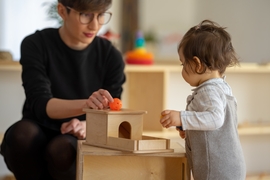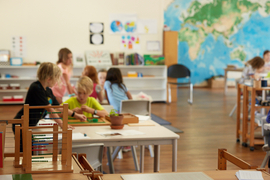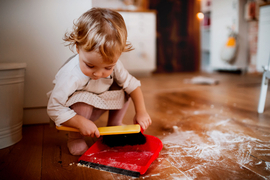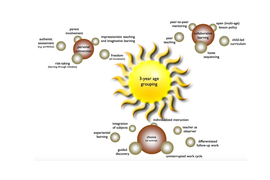
Parenting is one of the most rewarding and challenging roles we play as adults. Our society has high expectations of parents and yet we are not always able to access the resources we need to become the parent we want to be. Montessori can offer you a parenting framework from birth to maturity. It is more than an educational method; it is an approach to supporting the full development of your child.
Here are some simple, yet effective ways in which adults can support the development of a young child.
Movement
Your child will reach each milestone in their own time. Some children learn to walk before their first birthday and for others this doesn't happen until 16 months or older. Your child's acquisition of the movement milestones themselves is more important than the age at which they reach them.
- Once walking, your child will want to use their hands to start carrying things. Allow them to do this but make their surroundings as safe as possible.
- Let your child practice walking barefoot for as long and as often as possible. It will provide your child with greater sensory feedback and makes it easier to learn how to walk.
- Your child will be keen to practice walking up and down stairs, climbing hills and running in open spaces.
- Help your child develop body awareness by playing games such as “Head, shoulders, knees and toes”.
- Falling without injury is a great skill to develop and new walkers do tend to fall over. Your child will need an environment which is safe to learn and practice walking in.
Language
- Saying one word, by the time your child is 12 months old is fairly typical progression in language development.
- You are your child's first teacher and they will use the language model you provide to construct their mother tongue. Talk to your child and let them see your face, so that they can watch your mouth.
- Read books to your child - mix it up with books with no words, pages with 1 or 2 words and simple stories
- If your child takes an interest in anything give him the name, for example ‘plant’ or ‘tree’. Avoid using “baby-names” for objects or things, such as “doggy”.
- If your child has an ear infection take him to the doctor. Ear infections can cause language delays
Social Emotional Development
Feeling safe and loved will help your child to grow up to be emotionally strong. Young children need secure and loving relationships, which enable them to moderate their stress levels. These signfiicant relationships can include the mother and father, other family members and also caregivers such as childcare workers. When your child feels loved, this feeds their healthy brain development.
Remember, your young child is watching you and learning how to interact with other people from your actions. Use this attention as an opportunity to role model appropriate behaviours when engaging with anyone in front of your child.
Suggested Activities
Once your child is walking, they no longer require their hands to help them move. They will start using them to touch and carry everything within reach.
- Your child is a sensorial learner and their tendency for movement will drive them to explore their environment. As your child's movement possibilities increase, so will their scope for exploration. Create safe spaces for your child to explore independently.
- More is less when it comes to toys. Offer your child 2 or 3 activities on a low shelf and observe them to see what they are interested in and what they do with the objects. Follow your child's natural path of development, by rotating items off their shelf in favour of something new, when they no longer show an interest.
- Repetition is normal and good for brain development. If your child is interested in doing something, allow her time to do it again and again. Sometimes, just speaking whilst your child is busy will be enough to disturb their concentration. The only time to interrupt your child during an activity is if someone is going to get hurt or something is going to break.
- Try to keep television or screen-based activities to a minimum for children of this age group. Research shows that “screen-time” may be detrimental to infants under 2 years of age.



